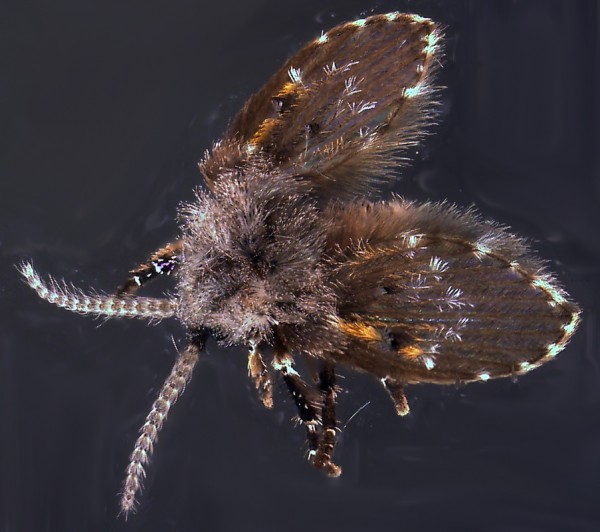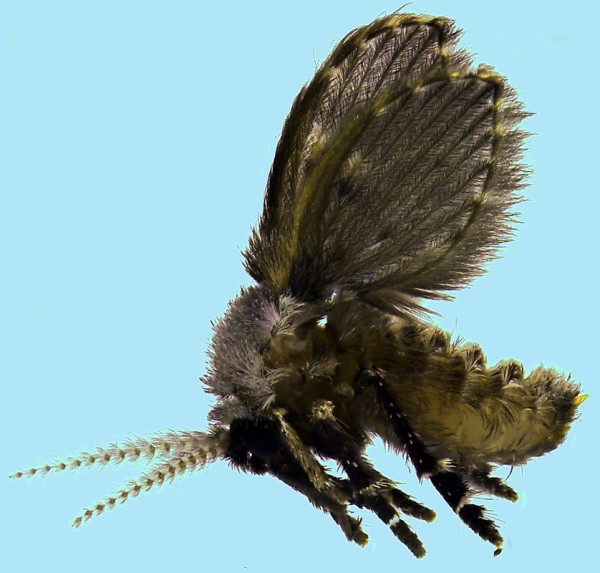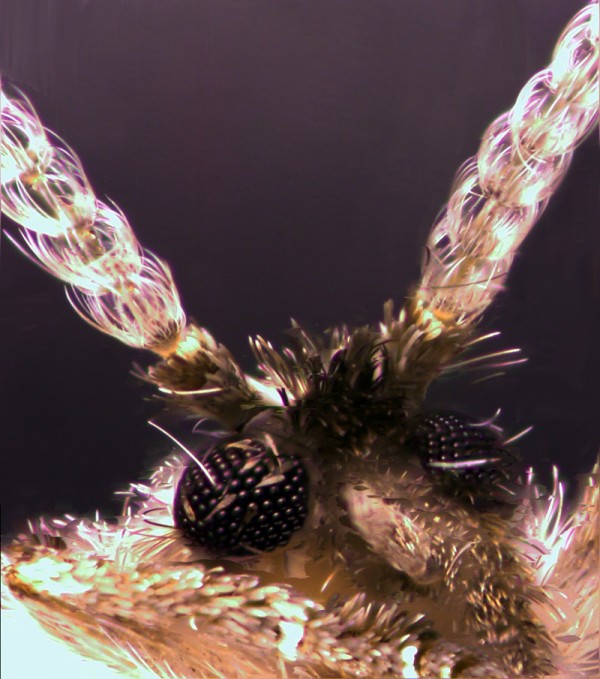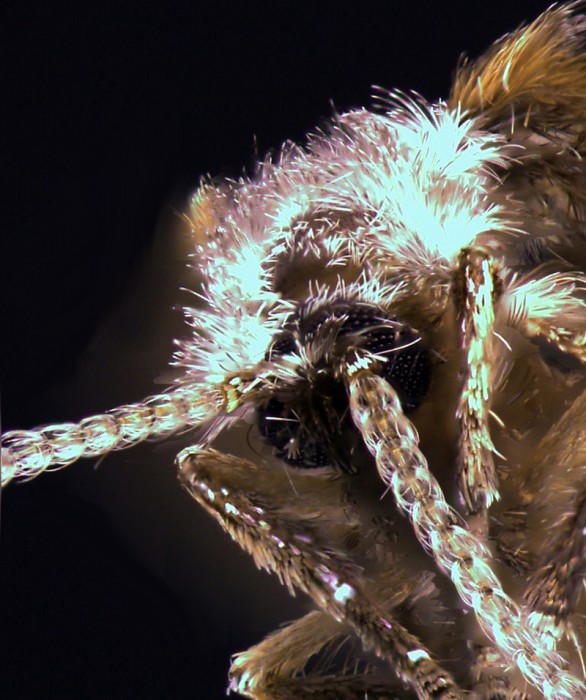Order: Diptera
Family: Psychodidae
Genus: Clogmia
Clogmia albipunctata is commonly called the filterfly, mothmidge or mothfly (1, 2) and belongs to the Suborder Nematocera (long-horned flies) within the Order Diptera (flies and mosquitoes). There are 24 families within Nematocera in North America (3). Nematocera are unique among the Diptera for having many segmented antennae that are often long (3). The larvae of Nematocera typically inhabit moist habitats and have well-developed heads and mandibles that move laterally (3). C. albipunctata is a member of the family Psychodidae (moth flies and sand flies) of which there are 112 species in four subfamilies within the United States (3). Psychodidae are called moth flies because they have small hairs on their wings that shed easily like a moth’s scales. Adults of this family live in dark, moist areas and can often be found in drains and sewers (3). Larvae of this family can live in decaying vegetation, mud, moss, or water (3). This and other members of its subfamily Psychodinae have extensions from the middle of the eyes extending past the base of the antennae (3). Its genus, Clogmia, has been separately considered a synonym of or a subgenus ofTelmatoscopus to which this specimen was previously assigned as Telmatoscopus albipunctata (4). C. albipunctata is distributed throughout tropical and subtropical areas of the world (4). It is one of the most common synanthropic (living with humans) species within the Psychodidae (4). It can found in containers or trash filled with water, bathrooms, kitchens, in sewers, and near wastewater treatment plants (1). C. albipunctata can also live in tree-holes and in phytothelmata (water bodies held by plants) (4). C. albipunctata can be identified in part by the color patterning on its wings with white spots at the tip of the wing veins (5, 6). However, to reliably identify other related Psychodidae specimens they must often be dissected and their antennae, wing, and genitalia mounted on slides for comparison (4, 5).

Clogmia albipunctata – Filter Fly

Clogmia albipunctata – Profile view

Clogmia albipunctata – Tight close up of head and antennae

Clogmia albipunctata – Close up of head
Clogmia albipunctata on Bugguide.net
Clogmia albipunctata on Wikipedia
Sources
(1) Hribar, L.T., J.J. Vlach, D. J. DeMay, S.S. James, J.S. Fahey, and E.M. Fussel, Mosquito Larvae (Culicidae) and Other Diptera Associated with Containers, Storm Drains, and Sewage Treatment Plants in the Florida Keys, Monroe County, Florida. The Florida Entomologist, vol. 87, (2004), pp. 199-203.
(2) Grimaldi, D and M.S. Engel, Evolution of the Insects, (2005), New York, Cambridge University Press.
(3) Triplehorn, C.A. and N.F. Johnson, Borror and Delong’s Introduction to the Study of Insects, 7th ed., (2005), Thomson Brooks/Cole.
(4) Ibáñez-Bernal, S., New records and descriptions of Mexican moth flies (Diptera: Psychodidae, Psychodinae). Transactions of the American Entomological Society vol. 134, (2008), pp. 87-131.
(5) Ibáñez-Bernal, S., Personal correspondence, (November 2008).
(6) Quate, Larry W. Revision of the Psychodidae (Diptera) in America north of Mexico. University of California Publications in Entomology, vol. 10, (1955), pp. 103-273.
(2) Grimaldi, D and M.S. Engel, Evolution of the Insects, (2005), New York, Cambridge University Press.
(3) Triplehorn, C.A. and N.F. Johnson, Borror and Delong’s Introduction to the Study of Insects, 7th ed., (2005), Thomson Brooks/Cole.
(4) Ibáñez-Bernal, S., New records and descriptions of Mexican moth flies (Diptera: Psychodidae, Psychodinae). Transactions of the American Entomological Society vol. 134, (2008), pp. 87-131.
(5) Ibáñez-Bernal, S., Personal correspondence, (November 2008).
(6) Quate, Larry W. Revision of the Psychodidae (Diptera) in America north of Mexico. University of California Publications in Entomology, vol. 10, (1955), pp. 103-273.
